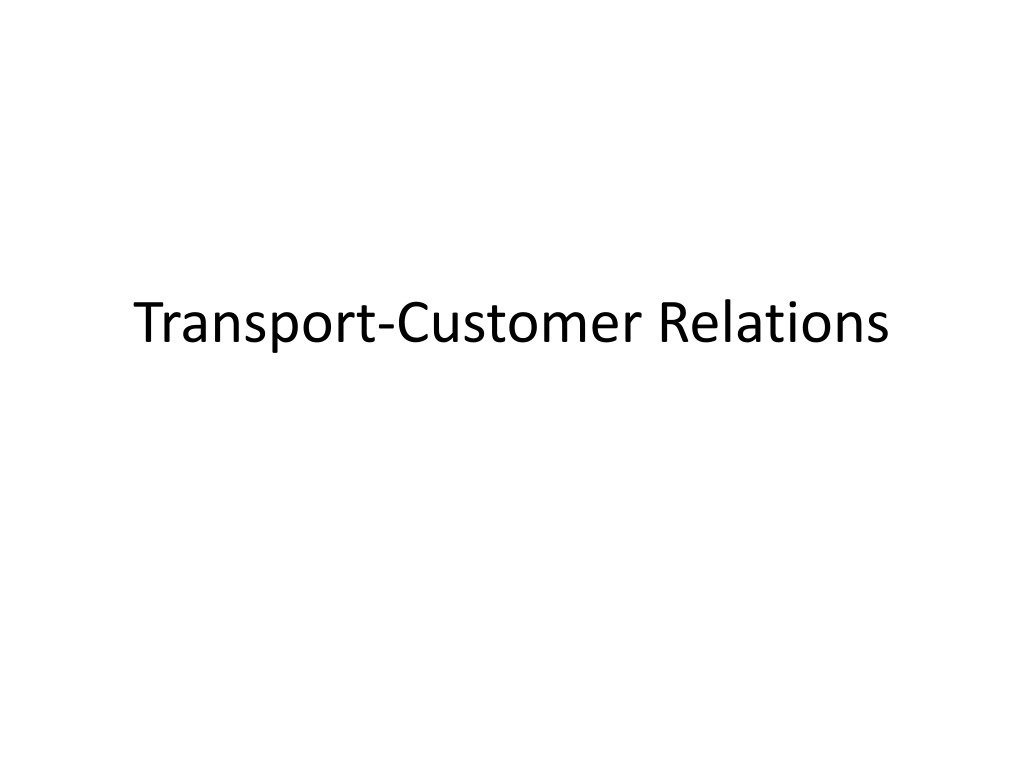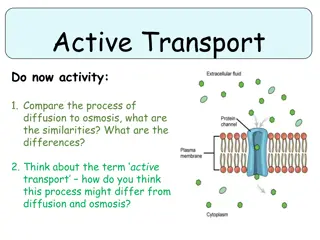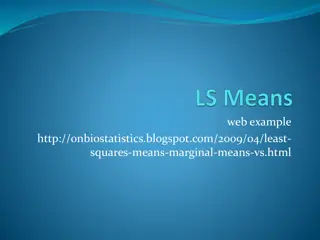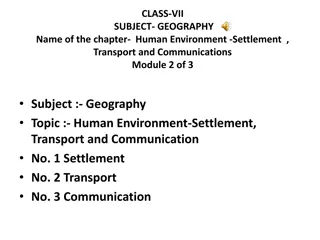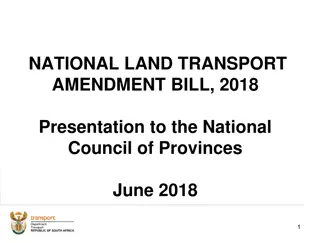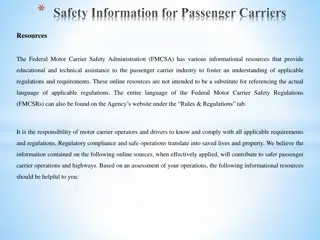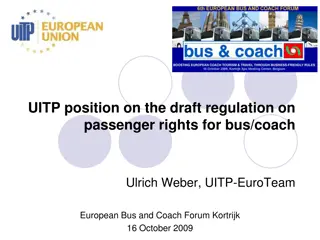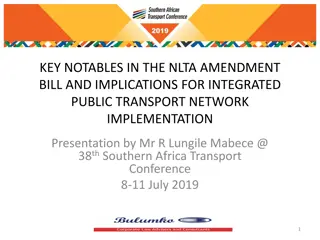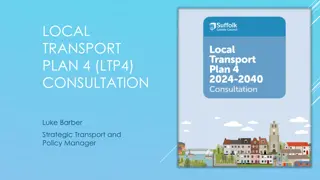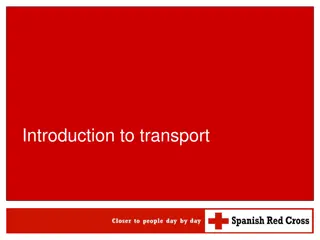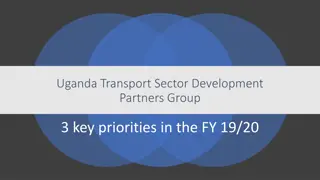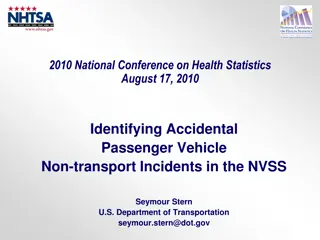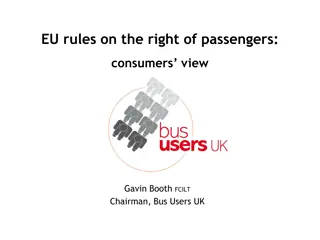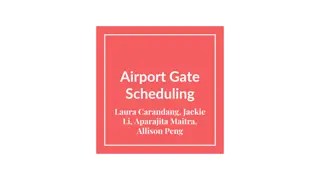Exploring Different Means of Transport and Improving Passenger Experience
Discover various modes of transportation and their pros and cons for both short and long distances. Learn how to enhance passenger comfort during journeys by air, rail, sea, and coach. Expand your transport-related vocabulary and write an engaging account of a multi-transport trip using selected terms. Identify synonyms in British and American English and practice making announcements in various travel settings.
Uploaded on Sep 30, 2024 | 0 Views
Download Presentation

Please find below an Image/Link to download the presentation.
The content on the website is provided AS IS for your information and personal use only. It may not be sold, licensed, or shared on other websites without obtaining consent from the author. Download presentation by click this link. If you encounter any issues during the download, it is possible that the publisher has removed the file from their server.
E N D
Presentation Transcript
Transport List some different means of transport. What are the advantages and disadvantages of each one for long or short distances? How do you prefer to travel? Why?
Exam Question Travelling can often be tiring and uncomfortable. What kinds of things can be done to make the journey more agreeable for the passenger travelling by these means of transport? air rail sea coach
Vocabulary These words are all connected with transport. Put them into logical sets. liner / toll / registration number / stand-by / track / press on / sail / runway / break down station wagon / set off / self-drive / long-haul / compartment / see off / crossing / drop off guard / platform / make for / jet lag / roundabout /highway / harbour / cruise / stopover / run out of / ticket collector / starboard / gangway
Writing Imagine that you recently accompanied a group of travellers on a trip involving several means of transport. Write a short account of the trip using as many of the words in the box above as you can. For example: At 6.30 p.m. we set off from Victoria station aboard the Orient Express in our first class compartment...
Vocabulary Find the pairs of synonyms and put them under the correct headings. For example: BRITISH ENGLISH driving licence AMERICAN ENGLISH driver's license puncture city centre line queue gas freeway petrol parking lot hood sidewalk driving licence pavement underground flat downtown subway car park motorway estate car station wagon bonnet driver's license Do you know any other words that are different in British and American English?
Making announcements It announcements especially if the public-address system is poor Listen to the messages. Which would you hear: a on a train/at a railway station? b on board ship? c at an airport/on a plane? d on a bus? can often be difficult made to public understand places, in
a. The next stop will be Terminal Two. b. Would all foot passengers please proceed to the disembarkation point on B deck. c. Mind the doors! d. Would Mr Vince Chung, a passenger on British Airways flight BA 755 to Hong Kong, please go to the Flight Information Desk? e. The train arriving on platform four is the 10.13 for London Victoria, stopping at Rochester, Chatham and Bromley South. f. UK 700 to Edinburgh. Passengers are advised pre-flight checks are being carried out. Departure will be delayed for approximately half an hour. g. In the unlikely event of an emergency, all passengers should proceed to the nearest muster station where a member of crew will issue everyone with a lifejacket. h. Good morning, passengers. Captain Nolan and his crew would like to welcome you on board this airbus number 820 to Hamburg. i. Would Miss Andreas please report to the Purser's Office next to the duty free? j. Good morning, ladies and gentlemen. The maitre d'hotel will be coming to your compartment in a few minutes ' time to take orders for brunch. k. We regret to announce that there is an industrial dispute on the Italian rail ways, therefore the transfer between Innsbruck and Venice will be by coach. I. We'll be flying over the Atlantic at thirty-five thousand feet. m. Ladies and gentlemen, as we drive round the corner, here in the main squa re, if you look to your right you can see the famous Leaning Tower. n. Passengers are advised not to leave their luggage unattended. o. We're now approaching Pigeon Point, Tobago, where passengers can disembark. p. We regret to announce a delay of approximately half an hour to the departure of Flight KLM 452 for Lima via Amsterdam. This is owing to a slight technical problem. q. Would the owner of a red Ford Escort registration number L632 NVK please remove this vehicle immediately from the front entrance where it is causing an obstruction. r. We are now approaching the harbour entrance. Will all drivers of vehicles please proceed to the car deck.
Useful vocabulary What sort of person are you? tidy organised efficient sympathetic professional polite responsible friendly motivated Unfortunately, some people are not. Use these prefixes to describe people who behave in the opposite way: un- im- ir- in- dis- experienced patient capable
Useful vocabulary What prefix is used to form the opposite of all these verbs? behave interpret manage direct quote hear treat calculate understand
Infinitive (to) or gerund (- ing)? Look at these examples: I wish to claim compensation. (NOT I wish claiming compensation.) I suggest writing to the manager. (NOT I suggest to write to the manager.) Put the following verbs into two groups: those that are followed by an infinitive and those followed by the gerund. admit afford anticipate arrange avoid choose claim consider decide demand deny expect involve justify manage offer plan postpone promise refuse risk save suggest delay hope mind recommend fail miss undertake
Rewrite the following sentences without changing their meaning. Use a second verb in the infinitive or the gerund each time. For example: She hasn't got enough money to travel fi rst class. She can't afford to travel first class. If you don't pay the invoice soon there may be a 10 per cent penalty charge. If you delay I think it would be a good idea to write to the tour operator. I suggest . Would it be inconvenient for you to wait a little longer? Would you mind ... OK, yes, I made a mistake about the time but not the date. I admit . I'll do my best to have an answer within a week. I promise ... If I were you, I would make a strongly-worded complaint. I recommend. The guide said she certain ly did not turn up late. The gUide denied It would require us to make a change in the schedule. It would mean.
Infinitive (to) or gerund (- ing)? Some verbs can take both the infinitive and the gerund but with a change of meaning. Can you explain how the meaning of the verb changes in each of these pairs? 1 a They stopped to take extra passengers on board . b They stopped taking extra passengers on board. 2 a You must remember to write to them. b You must remember writing to them. 3 a I'll try to phone her when the meeting finishes. b I'll try phoning her when the meeting finishes. 4 a If you want any compensation it will mean taking them to court. b Sorry, I didn't mean to take your seat. 5 a He went on complaining about his holiday for at least half an hour. b After describing the terrible journey he went on to complain about the state of the accommodation.
Exam question Think about situations when you have complained and answer these questions. a How did the person you spoke to react to your comments? b What action was taken to solve your problem? c How satisfied were you with the result?
Speaking Do you agree or disagree with the following statements? Why? a You should thank the person for having made the complaint. b You should avoid making an apology unless it is requ ested. c You should never say anything was your fault. d You should never blame a member of staff who works in the same organisation as yourself. e You should always explain the cause of the problem. f You should say that the error was exceptional. g You should say what action is being/has been taken. h You should make some sort of special offer as compensation
When it pays to complain A dissatisfied customer who complains is just as likely to remain loyal as a completely satisfied customer. This surprising state of affairs has been observed by British Airways, which has turned the handling of complaints into something of a science. Charles Weiser, BA's head of customer relations, calculates that about 13 per cent of customers who are complerely satisfied with BA's service may not fly with the airline again. "Perhaps they changed jobs, found a frequent flyer programme which better suited their needs, or maybe they felt it was time for a change of airline," he says, writing in the July issue of Consumer Policy Review, the journal published by the UK's Consumers' Association. Half of all customers who experience problems but do not complain, do nor intend to use the airline again. This contrasts with the customers who are dissatisfied but do complain - just 13 per cent of this group will defect, the identical rate of defection as the "satisfied" group, says Weiser. Clearly, it pays to encourage customers to complain, and to encourage complaints departments to turn themselves from "blame" to "customer retention" departments, he says. Weiser's guide to satisfying complaints includes the following points: Apologise and "own" the problem. Customers do not care whose fault it was - they want someone to say sorry and champion their cause. Do it quickly - customer satisfaction with the handling of a complaint dips after five days. Assure customers the problem is being fixed. Complaints departments need to know their company inside out and work with front-line departments. Do it by phone. Many departments are frightened of the emotion customers often show when things go wrong, but customers appreciate a personal apology and reassurance the problem will be solved.
Reading comprehension Read the article and decide if these statements are true or false. Correct any false statements. a A dissatisfied customer who makes a compl aint will usually fly again with British Airways. b About one sixth of SA's satisfied customers defect to other airlines. c Both sat,isfied and dissatisfied customers will fly with SA again in about the same proportions. d BA gives money to customers jf they complain. e Customers are anxious to find out who was responsible for things going wrong. f It is not a good idea to admit to being in the wrong.
Situation 1 Student A: You have just checked into a hotel and you have noticed that there are no towels in the bathroom. You go down to reception. Student B: You are a hotel receptionist. A customer has just come into the lobby and wants to speak to youo Situation 2 Student A: You are the manager of a hotel and feeling pleased with yourself because you have a 100 per cent occupancy rate for this week. A customer has just asked to speak to you . . Student B: You are staying at a beach reso rto The hotel room is fine, but outside at certain times of day there is an unpleasant smell coming f rom the local municipal rubbish dump down the road. You ask to speak to the manager. Situation 3 Student A:You arrived at the resort yesterday on a f ifteen day package but the courier failed to turn up in the morning. You are angry because you feel you have lost half a day you had paid for. Student B:You are a resort representat iveo Someone has asked to speak to youo Situation 4 Student A: You work in a travel agency. A customer has just come through the door and is looking angry. Student B: You bought a return airline ticket from a travel agency but the wrong time was written on the return t icket and you missed your flight. You had to purchase another ticket for a later flight (which, to make matters even worse, was delayed), and as a resu lt you missed a very important business meeting. You want to know what the agency is going to do about it. Take turns to make/ deal with a complaint in four different situations.
Language for handling complaints Introducing your complaint I'm not one to make a fuss. but. I don't want to complain, but ... I'm sorry, but I really feel I have to make a complaint about. Handling a complaint I'm sorry to hear that. Let me take the full particulars. I fully understand. I will do my best to sort it out.
Writing Customer Satisfaction Survey
